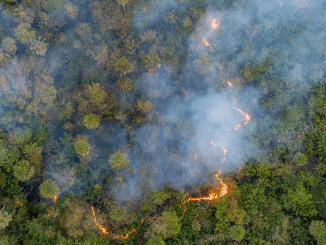
BRIDGETOWN, Barbados, March 2, 2021 (ENS) – A new initiative to support Latin America and the Caribbean in transitioning to a circular economy is underway. The Regional Coalition on Circular Economy will support and promote access to financing by governments and the private sector, with special emphasis on small and medium enterprises.
The new coalition defines a circular economy as “a resilient, diverse and inclusive economic model that creates opportunities for a sustainable growth that moves away from a ‘take, make, waste’ mentality. It fosters long-term economic productivity and green jobs, while tackling global challenges like climate change, pollution and biodiversity loss.”

This new effort to promote mobilization of funding for innovation and for the implementation of specific projects is viewed by participating governments as part of the region’s COVID-19 recovery. It was announced in February during a virtual side event at a meeting of the region’s environment ministers, hosted by Barbados and the United Nations Environment Programme, UNEP.
Many Caribbean economies have been devastated by a tourism collapse caused by COVID-19, as well as a series of natural disasters.
“A key part of helping countries grow in ways that benefit all citizens is overcoming large infrastructure investment deficits, estimated at five percent of GDP for Latin America and the Caribbean,” explained the coalition’s strategic partner, the Inter-American Development Bank in a statement.
Coordinated by UNEP, the coalition will be led by a steering committee composed of four high-level government representatives who will serve on a rotating basis, starting with Colombia, Costa Rica, the Dominican Republic and Peru for the 2021-2022 period.
“As extracting, wasting and doing business as usual can no longer be supported by the planet, it is key to build a common regional vision on circular economy,” said Carlos Correa, minister of environment and sustainable development of Colombia, who chairs the Coalition.
“The coalition we are launching today will help precisely to do that and to implement concrete and measurable practices,” Correa said.
The initiative will count on eight permanent strategic partners:
* – the Climate Technology Centre & Network. Based in Copenhagen, Denmark, this is the operational arm of the UN Framework Convention on Climate Change Technology Mechanism.
* – the Ellen MacArthur Foundation, based on the Isle of Wight, UK
* – the Inter-American Development Bank
* – the Konrad Adenauer Foundation
* – the Platform for Accelerating the Circular Economy Coalition
* – the United Nations Industrial Development Organization
* – the World Economic Forum
* – the UN Environment Programme, UNEP
As one example of how the funding will work, the Caribbean Governors of the Inter-American Development Bank have backed Build Forward, a US$3.5 billion multi-year program to help Caribbean countries sustainably recover while making technological leaps for a transformational future.
The initiative includes a multi-donor facility to provide targeted grants and concessional financing for smart and resilient projects. The facility is expected to mobilize US$1.5 billion in resources for a series of activities that include advisory services, project preparation and catalyzing private capital for investments in resilient infrastructure, nature and disaster-risk-based solutions.

Therese Turner-Jones, the bank’s general manager of the Department of the Caribbean Region. “Build Forward is focused on giving citizens of the Caribbean the opportunity to thrive in the more digital future. It will provide better infrastructure services for all citizens, creating jobs, reducing poverty, and bringing much-needed advanced technology into the region.”
Driven by eco-design, a circular economy eliminates waste and pollution, keeps products and materials in use, and regenerates natural systems. Adopting these principles can reduce the use of raw materials by up to 99 percent, contributing to protecting biodiversity, according to UNEP’s International Resource Panel.
While current climate discussions focus on switching from fossil fuels to renewable energy and energy efficiency, which will address 55 percent of the total greenhouse gas emissions, a circular economy can help address the remaining overlooked 45 percent, emissions that are generated by the way we make and use products and the way we produce food, according to the Ellen MacArthur Foundation.
The coalition aims to implement a circular economy approach through collaboration between governments, businesses, and society as a whole.
On the Day of the Recycler and Recycling, which will be celebrated annually on March 1 from this year forward, Minister Correa visited the warehouse of the Bogotá Waste Pickers Association, made up of 18,000 members and 24 cooperatives.
This March 1 waste pickers are paying homage anew to the fellow waste pickers who were murdered in Colombia in 1992. In their honor, this date has become a global day in which recyclers coordinate through recognizing the dignity of their own struggles and conducting activities related to recycling.
“Recycling is a transcendental step in the circular economy to prevent waste that can be reused going to landfills. For recyclers, who are very necessary in our society, to carry out their work well, it is essential that all of us in our homes and businesses make use of the color code for the classification of waste,” said Correa, who is implementing a new National Circular Economy Strategy and a new Policy for Solid Waste Management in Colombia.
Leo Heileman, UNEP regional director in Latin America and the Caribbean, said, “The creation of this coalition reaffirms the region’s commitment to the implementation of the 2030 Agenda, with special emphasis on Sustainable Development Goal 12, Sustainable Consumption and Production, through the promotion of innovation, sustainable infrastructure, and an inclusive and circular economy.”
“Acknowledging that unsustainable consumption and production patterns are the root cause of the three planetary crises we face today – climate change, pollution and biodiversity loss,” said Heileman, “we have a unique opportunity to rethink our linear economy and reshape our unsustainable consumption and production patterns.”
Featured Image: Made from recycled aluminum the sculpture Floralis Genérica stands in the Plaza Naciones Unidas, Recoleta, Buenos Aires, Argentina. (Photo by Matt Hintsa)
© 2021, Environment News Service. All rights reserved. Content may be quoted only with proper attribution and a direct link to the original article. Full reproduction is prohibited.



